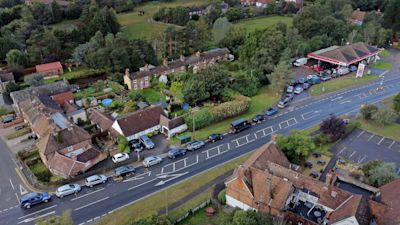Fuel crisis: 'Marked improvement’ but 20% of petrol stations in south-east still out of fuel

London and the south-east are still experiencing fuel shortages as the crisis continues in some parts of the country, ITV News Correspondent Geraint Vincent reports
Around a fifth of petrol stations in London and the south-east are still without fuel despite the intervention of the military.
But the picture around the rest of the country is seen to be improving, with only 8% of petrol stations lacking petrol and diesel, adding that 86% of sites surveyed have both petrol and diesel available.
The Petrol Retailers Association (PRA) said London and the south-east have only see a “marginal” improvement, with these areas still facing a “challenging” time. Its survey of a quarter of all independent petrol stations in Great Britain on Monday morning showed that around a fifth of sites around London and the south-east remained without fuel.
The association represents independent forecourts across the UK and works with around 80% of all motorway services areas.
Soldiers are seen driving a fuel tanker
Members of the armed forces arrived at the Buncefield oil depot in Hemel Hempstead on Monday to help deliver fuel, with soldiers – in uniform and wearing face masks – seen walking near the gates to the Hertfordshire Oil Storage Terminal.
It is understood almost 200 military personnel were due to be deployed from Monday, including 100 drivers.
By the end of this week it is expected that 150 crews will be delivering fuel across the UK.
The majority of the first tranche of military personnel are being deployed to terminals that service London and the South East, targeting the areas most in need of support.
In a further sign of an improving situation, forecourt operator EG Group announced on Monday that it would remove the £30 cap on fuel sales.
The government has however already deployed its reserve tanker fleet – driven by civilians – since last week in an effort to bolster supplies.
Chancellor Rishi Sunak told ITV that the "situation is definitely improving", with one fifth of petrol station forecourts now closed, compared to two thirds last week.
"Every single day of the last week we've had more fuel delivered than was taken out at petrol stations," he added.
Despite insisting that the fuel shortage was easing, a government spokesperson said the troops will first be deployed to south-east England where shortages are the worst.
“We are working closely with industry to help increase fuel stocks and there are signs of improvement in average forecourt stocks across the UK with demand continuing to stabilise," the spokesperson said.
“Stocks in London and the south of England have been recovering at slightly slower rates than other parts of the UK, so we have begun deploying military personnel to boost supply in these areas.
“More than half of those who have completed training to make fuel deliveries are being deployed to terminals serving London and the south-east of England, demonstrating that the sector is allocating drivers to areas most affected in this first phase from Monday.”
Boris Johnson, attending the opening day of the Tory Party conference in Manchester on Sunday, expressed confidence the crisis was “abating” and said the military were being deployed as a “precaution”.
The prime minister however repeatedly refused to rule out shortages in the wider economy in the run up to Christmas.
As well as an estimated shortfall of 100,000 HGV drivers, businesses from meat producers to retail, have warned of empty shelves if the shortages are not addressed.
Mr Johnson acknowledged the country was going through a “period of adjustment” following Brexit, which has cut off the supply of labour from the EU.
He insisted that he was not prepared to resolve the situation by pulling “the big lever marked uncontrolled immigration” to let in more foreign workers.
He said firms should ensure their employees were “decently paid” if they wanted to get more staff.